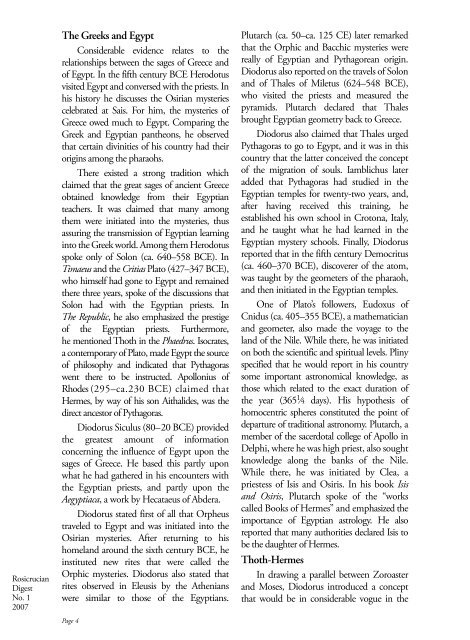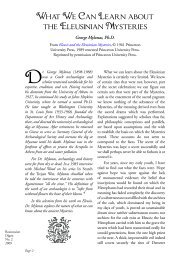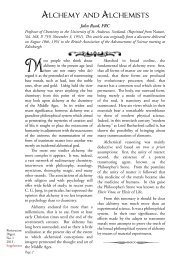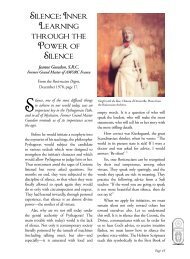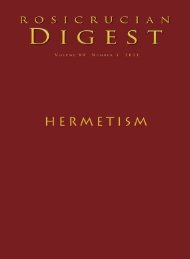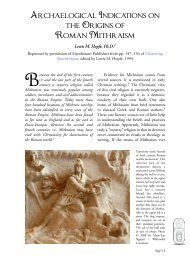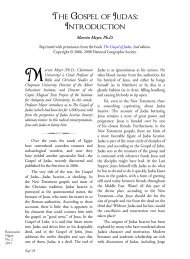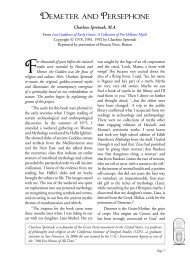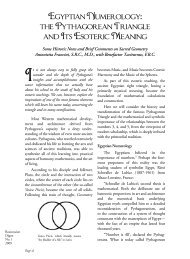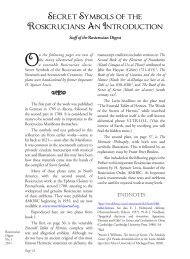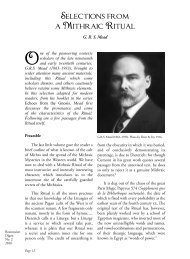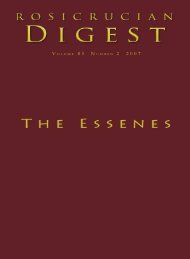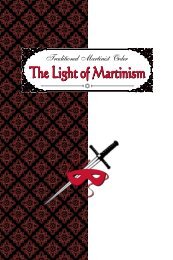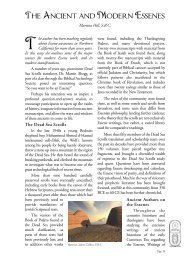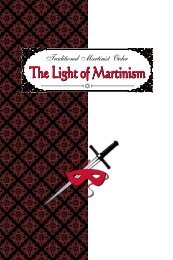Digest - Rosicrucian Order
Digest - Rosicrucian Order
Digest - Rosicrucian Order
You also want an ePaper? Increase the reach of your titles
YUMPU automatically turns print PDFs into web optimized ePapers that Google loves.
<strong>Rosicrucian</strong><br />
<strong>Digest</strong><br />
No. 1<br />
2007<br />
The Greeks and Egypt<br />
Considerable evidence relates to the<br />
relationships between the sages of Greece and<br />
of Egypt. In the fifth century BCE Herodotus<br />
visited Egypt and conversed with the priests. In<br />
his history he discusses the Osirian mysteries<br />
celebrated at Sais. For him, the mysteries of<br />
Greece owed much to Egypt. Comparing the<br />
Greek and Egyptian pantheons, he observed<br />
that certain divinities of his country had their<br />
origins among the pharaohs.<br />
There existed a strong tradition which<br />
claimed that the great sages of ancient Greece<br />
obtained knowledge from their Egyptian<br />
teachers. It was claimed that many among<br />
them were initiated into the mysteries, thus<br />
assuring the transmission of Egyptian learning<br />
into the Greek world. Among them Herodotus<br />
spoke only of Solon (ca. 640–558 BCE). In<br />
Timaeus and the Critias Plato (427–347 BCE),<br />
who himself had gone to Egypt and remained<br />
there three years, spoke of the discussions that<br />
Solon had with the Egyptian priests. In<br />
The Republic, he also emphasized the prestige<br />
of the Egyptian priests. Furthermore,<br />
he mentioned Thoth in the Phaedrus. Isocrates,<br />
a contemporary of Plato, made Egypt the source<br />
of philosophy and indicated that Pythagoras<br />
went there to be instructed. Apollonius of<br />
Rhodes (295–ca.230 BCE) claimed that<br />
Hermes, by way of his son Aithalides, was the<br />
direct ancestor of Pythagoras.<br />
Diodorus Siculus (80–20 BCE) provided<br />
the greatest amount of information<br />
concerning the influence of Egypt upon the<br />
sages of Greece. He based this partly upon<br />
what he had gathered in his encounters with<br />
the Egyptian priests, and partly upon the<br />
Aegyptiaca, a work by Hecataeus of Abdera.<br />
Diodorus stated first of all that Orpheus<br />
traveled to Egypt and was initiated into the<br />
Osirian mysteries. After returning to his<br />
homeland around the sixth century BCE, he<br />
instituted new rites that were called the<br />
Orphic mysteries. Diodorus also stated that<br />
rites observed in Eleusis by the Athenians<br />
were similar to those of the Egyptians.<br />
Page 4<br />
Plutarch (ca. 50–ca. 125 CE) later remarked<br />
that the Orphic and Bacchic mysteries were<br />
really of Egyptian and Pythagorean origin.<br />
Diodorus also reported on the travels of Solon<br />
and of Thales of Miletus (624–548 BCE),<br />
who visited the priests and measured the<br />
pyramids. Plutarch declared that Thales<br />
brought Egyptian geometry back to Greece.<br />
Diodorus also claimed that Thales urged<br />
Pythagoras to go to Egypt, and it was in this<br />
country that the latter conceived the concept<br />
of the migration of souls. Iamblichus later<br />
added that Pythagoras had studied in the<br />
Egyptian temples for twenty-two years, and,<br />
after having received this training, he<br />
established his own school in Crotona, Italy,<br />
and he taught what he had learned in the<br />
Egyptian mystery schools. Finally, Diodorus<br />
reported that in the fifth century Democritus<br />
(ca. 460–370 BCE), discoverer of the atom,<br />
was taught by the geometers of the pharaoh,<br />
and then initiated in the Egyptian temples.<br />
One of Plato’s followers, Eudoxus of<br />
Cnidus (ca. 405–355 BCE), a mathematician<br />
and geometer, also made the voyage to the<br />
land of the Nile. While there, he was initiated<br />
on both the scientific and spiritual levels. Pliny<br />
specified that he would report in his country<br />
some important astronomical knowledge, as<br />
those which related to the exact duration of<br />
the year (365 1 ⁄4 days). His hypothesis of<br />
homocentric spheres constituted the point of<br />
departure of traditional astronomy. Plutarch, a<br />
member of the sacerdotal college of Apollo in<br />
Delphi, where he was high priest, also sought<br />
knowledge along the banks of the Nile.<br />
While there, he was initiated by Clea, a<br />
priestess of Isis and Osiris. In his book Isis<br />
and Osiris, Plutarch spoke of the “works<br />
called Books of Hermes” and emphasized the<br />
importance of Egyptian astrology. He also<br />
reported that many authorities declared Isis to<br />
be the daughter of Hermes.<br />
Thoth-Hermes<br />
In drawing a parallel between Zoroaster<br />
and Moses, Diodorus introduced a concept<br />
that would be in considerable vogue in the


